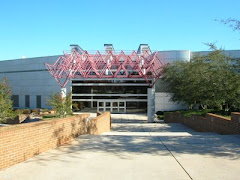Our Three Kinds of Research Sources:
1. Our Books
The Books PageSearch here for books of all kinds: Print Books; eBooks; eReference Books; Books you can Borrow; Books on the Internet
2. Our Databases & eReference Sources
(Peer-Reviewed journals will be included here)
All-Discipline databasesSearch here for journal articles & background eReference sources across all fields and disciplines. A good place to begin.
Specialized databases more advanced research, go to our Special Subject Pages, which allow you to search databases & background eReference sources that focus on particular fields or disciplines.
3. Our Videos
Video DatabasesSearch here for thousands of streaming videos across all subject fields. Capture video clips and paste them into your PowerPoint presentations.
Thursday, August 25, 2011
Tuesday, August 9, 2011
Ramadan
August is the sacred Muslim month of Ramadan, the ninth month of the Islamic year, set aside for fasting. If you're searching for additional information on this topic, Oxford Reference Online is a great source. Start by checking out The Concise Oxford Dictionary of World Religions or The Oxford Dictionary of Islam.
Monday, June 27, 2011
Literature Notebooks Online
The Literature Notebooks online format has been updated. The universe of included sources has been greatly expanded. In addition to the reference sources of the previous versions, we now have links to hundreds of full-length (non-reference) books (many with multiple links to indiviidual sections & chapters). For example, almost all of our various Harold Bloom series are now included in the database. Plus lots of other regular books as well. There are now almost 7000 separate links.
Monday, May 30, 2011
TEAS Test
The TEAS test is the standard test used for Nursing Admissions. The Library has a few copies available For Library Use only. For more information, see http://tctc.libanswers.com/a.php?qid=63994.
Don't forget to also look at the Library nursing page at: http://library.tctc.edu/nursing. The Associate Degree in Nursing page is at: http://www.tctc.edu/Content/Academics/Prepare_for_a_Career/Nursing_(ADN).xml
Don't forget to also look at the Library nursing page at: http://library.tctc.edu/nursing. The Associate Degree in Nursing page is at: http://www.tctc.edu/Content/Academics/Prepare_for_a_Career/Nursing_(ADN).xml
Wednesday, May 25, 2011
Alexander Street Press adds content to Music Online!
Highlights of new content include:
-Miles to Go, The Lost Years: An Intimate Memoir of Life on the Road with Miles Davis 1973-1983 -That's Got 'em: The Life and Music of Wilbur C. Sweatman -The Supremes: A Saga of Motown Dreams, Success and Betrayal -There's A God On the Mic: The True 50 Greatest MCs -Let the World Listen Right: The Mississippi Delta Hip-Hop Story -Barrelhouse Blues: Location Recording and Early Traditions of the Blues -Becoming Jimi Hendrix: From Southern Crossroads to Psychedelic London, The Untold Story of a Musical Genius -The Singing Campaign for Ten Thousand Pounds: Or, the Jubilee Singers in Great Britain
Music Online now equals:
692,652 tracks
99,495 pages text reference
24,368 scores (400,000 pages)
488 videos
http://liboc.tctc.edu:2048/login?url=http://music.alexanderstreet.com
-Miles to Go, The Lost Years: An Intimate Memoir of Life on the Road with Miles Davis 1973-1983 -That's Got 'em: The Life and Music of Wilbur C. Sweatman -The Supremes: A Saga of Motown Dreams, Success and Betrayal -There's A God On the Mic: The True 50 Greatest MCs -Let the World Listen Right: The Mississippi Delta Hip-Hop Story -Barrelhouse Blues: Location Recording and Early Traditions of the Blues -Becoming Jimi Hendrix: From Southern Crossroads to Psychedelic London, The Untold Story of a Musical Genius -The Singing Campaign for Ten Thousand Pounds: Or, the Jubilee Singers in Great Britain
Music Online now equals:
692,652 tracks
99,495 pages text reference
24,368 scores (400,000 pages)
488 videos
http://liboc.tctc.edu:2048/login?url=http://music.alexanderstreet.com
Monday, May 23, 2011
Alexander Street Press New Video Titles
Angels of Vengeance: After World War II, a small group of Jews sought out war crime perpetrators and planned punishments on their own outside of the sanctioned justice systems. Their tactics included plans to poison water sources in German cities and poison bread distributed to SS prisoners held in Allied POW camps. Members of this group describe their experiences for the first time in this video. http://whiv.alexanderstreet.com/View/1645943/
In Voices from the Attic, the film's producer interviews members of her family who survived the Holocaust by living in a peasant's attic hideout for two years. The film explores how this experience has affected the lives of subsequent generations in this family as well as the survivors themselves. http://whiv.alexanderstreet.com/View/1646927/
On a different topic, Weave of Time is an exploration of 50 years of Navajo culture. It includes a 1938 interview with a Navajo family, filmed by an anthropologist, and contrasts this with interviews with the same family, conducted in the 1980s. This is a fascinating way to explore cultural and historical changes to the Navajo culture across 50 years of U.S. history.
In Voices from the Attic, the film's producer interviews members of her family who survived the Holocaust by living in a peasant's attic hideout for two years. The film explores how this experience has affected the lives of subsequent generations in this family as well as the survivors themselves. http://whiv.alexanderstreet.com/View/1646927/
On a different topic, Weave of Time is an exploration of 50 years of Navajo culture. It includes a 1938 interview with a Navajo family, filmed by an anthropologist, and contrasts this with interviews with the same family, conducted in the 1980s. This is a fascinating way to explore cultural and historical changes to the Navajo culture across 50 years of U.S. history.
Tuesday, May 10, 2011
Subscribe to:
Posts (Atom)



